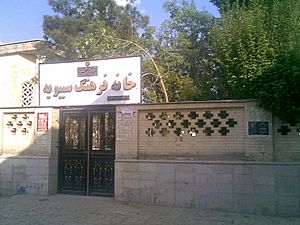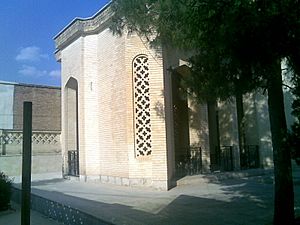Sibawayh facts for kids
Quick facts for kids
Sibawayh
سيبويه |
|
|---|---|

Entrance to Sibawayh's tomb in Shiraz
|
|
| Born | c. 760, Shiraz, Persia, Abbasid Caliphate |
| Died | c. 796, Shiraz, Persia or Basra, Iraq, Abbasid Caliphate |
| Era | Medieval philosophy |
| Region | Islamic philosophy |
|
Main interests
|
Arabic and Persian |
|
Influences
Al-Khalīl ibn Ahmad al-Farahidi |
|
|
Influenced
|
|
Sibawayh (Arabic: سِيبَوَيْهِ Sībawayhi or Sībawayh; Persian: سِیبُویه Sībūyah; c. 760–796) was a very important Persian scholar. His full name was Abu Bishr Amr ibn Uthman ibn Qanbar al-Basri. He was a leading expert in Arabic grammar from the city of Basra.
Sibawayh wrote the first major book about the Arabic language. This famous book, called Al-Kitāb (which means "The Book"), is still a key text today. It helps us understand how Arabic works. Many historians say Sibawayh was one of the greatest language experts of all time.
Contents
Discovering Sibawayh's Life
Sibawayh was born around the year 760 in Shiraz, a city in what is now Iran. There are different stories about where he lived and died. Some say he went to Basra and then Baghdad, before returning to a village near Shiraz. He passed away when he was just over 40 years old.
His nickname, Sibuyeh, comes from Persian and means "scent of apples." People said it referred to his "sweet breath." He learned about different Arabic dialects from famous teachers like al-Akhfash al-Akbar. His most important teacher was Al-Khalil ibn Ahmad al-Farahidi, who taught him a lot about language.
Famous Language Debates
Even though Sibawayh was a brilliant scholar, he wasn't a native Arabic speaker. This led to some interesting stories and debates about Arabic grammar. These discussions helped shape the rules of the Arabic language.
The Hornet Question
One famous debate happened in Baghdad with the vizier Yahya ibn Khalid. Sibawayh, representing the Basra school of grammar, argued with al-Kisa'i. Al-Kisa'i was a leading expert from the rival school of Kufa. Their disagreement became known as "The Question of the Hornet."
The debate was about the end of this sentence:
- Arabic: كُنْتُ أَظُنُّ أَنَّ ٱلْعَقْرَبَ أَشَدُّ لَسْعَةً مِنَ الزُّنْبُورِ، فَإِذَا هُوَ إِيَّاهَا.
- "I always thought the scorpion stung worse than the hornet, and sure enough it is."
Both scholars agreed that a verb was missing. But they disagreed on how to finish the sentence correctly.
Sibawayh thought it should end with fa-'iḏā huwa hiya (فإذا هو هي). This means "and-thus he [is] she." He argued that Arabic doesn't need a verb like "is" in the present tense. He also said that object forms like ('iyyā-)hā should not be the main part of a sentence's description.
Al-Kisa'i believed it should be fa-'iḏā huwa 'iyyā-hā (فإذا هو إياها). This means "and-thus he [does] onto-her." He used the object pronoun -hā ("her") with the particle iyyā-. This is similar to how in English, people sometimes debate "it is she" versus "it is her."
To Sibawayh's surprise, al-Kisa'i brought in four Bedouins. They were native Arabic speakers who "happened" to be nearby. Each of them said that huwa 'iyyā-hā was the correct way to say it. So, Sibawayh's answer was judged wrong.
After this, Sibawayh left the court. It is said he returned to Shiraz, feeling upset or ill, and died soon after. Later, one of Sibawayh's students, al-Akhfash al-Asghar, challenged al-Kisa'i. He proved al-Kisa'i wrong many times. Al-Kisa'i then admitted his mistake to the Caliph Harun al-Rashid.
Sibawayh's Lasting Impact
Sibawayh's book, Al-Kitab, was the first detailed Arabic grammar written by someone who wasn't a native speaker. He used logic to explain how language works, which was a new idea for his time. Both Sibawayh and his teacher al-Farahidi were very important in writing down the rules of the Arabic language.
This work was important for non-Arab Muslims. It helped them correctly understand the Quran. The poetic language of the Quran can be hard to understand, even for native Arabic speakers. Sibawayh's work helped ensure correct pronunciation and understanding of God's Word.
Later scholars often compared themselves to Sibawayh. For example, Niftawayh was given his name because he loved Sibawayh's works so much. Abu Turab al-Zahiri was called the "Sibawayh of the modern era." This was because, even though he was Arab, Arabic was not his first language.
The Famous Book: Al-Kitāb
Al-Kitāb or Kitāb Sībawayh ("Book of Sibawayh") is the most important grammar book for the Arabic language. It might even be the first major Arabic prose text. One historian said it was "unequaled before his time and unrivaled afterwards."
Sibawayh was the first to create a complete Arabic grammar book. In it, he explained the main rules of grammar. He also included many examples from Arabic sayings, poems, and verses. He got much of this information from his teacher, Al-Khalil ibn Ahmad al-Farahidi. Al-Farahidi was famous for writing the first Arabic dictionary, Kitab al-'Ayn.
Sibawayh's book came from a time when language studies were growing. This was especially true in the schools of Basra, Kufa, and later Baghdad. Sibawayh often mentioned al-Farahidi in his book. He would say things like "I asked him" or "he said."
Because Sibawayh died young, no one studied Al-Kitāb directly with him. However, his student, Al-Akhfash al-Akbar, wrote down the book. Al-Akhfash then shared Al-Kitāb with other students and grammarians. They helped spread Sibawayh's work and further developed the science of grammar.
Many later scholars wrote their own books and comments about Al-Kitāb. For example, Al-Mubarrad wrote an "Introduction to Sibawayh." He also asked if readers were ready for the book's challenges. Other scholars like Ibn al-Sari al-Zajjaj and Abu Bakr ibn al-Sarraj wrote comments on Sibawayh's use of poetry.
Understanding the Book's Format
Al-Kitāb has five volumes. It is a very long and detailed study of grammar. It is still mostly untranslated into English. Because it is so complex, later grammarians created simpler, shorter grammar books for general readers and students.
Al-Kitāb organizes grammar into different sections. These include syntax (how words form sentences) and morphology (how words are formed). It also has a section on phonetics (the sounds of language). Each chapter introduces a new idea with its definition.
Sibawayh often used verses of poetry to explain his rules. He took examples from many different sources. These included ancient poets, desert poets, and even newer poets from his own time.
Even though it's a grammar book, Sibawayh also discussed phonology. This means he talked about the correct way to pronounce the alphabet. He also discussed the idea that speech is a form of human behavior. He believed it should follow rules of right and wrong, and correct and incorrect usage.
Many linguists and scholars highly respect Al-Kitāb. They see it as the most complete and oldest Arabic grammar book still existing. One famous grammarian, Abu Hayyan al-Gharnati, memorized the entire book. He said its importance to grammar was like that of hadiths to Islamic law.
See also
 In Spanish: Sibuyé para niños
In Spanish: Sibuyé para niños
- Abu al-Aswad al-Du'ali
- Arabic grammar
 | Aurelia Browder |
 | Nannie Helen Burroughs |
 | Michelle Alexander |


